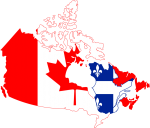
Separatism and Federalism: A View from Canada
These days there is much talk of federalism and separatism in Ukraine, and I have been anxiously watching from Canada, – Marta Dyczok


The pro-Canadian federalists won by a hair. 50.6% of Quebecers voted ‘no’ to independence, while 49.4% voted ‘yes.’ Canada was set up as a federation in 1867. Through a long process of negotiation, British and French settlers of three colonies reorganized themselves into four Canadian provinces. They decided they’d be better off resisting potential American encroachment by coming together into one state. Over time, other territories joined Canada.
Throughout it’s history Canada has faced the challenges of balancing federal-provincial relations. It’s difficult to accommodate people with diverse regional interests living in the world’s second largest geographic country. Particularly problematic has been the relationship between Quebec and the rest of Canada. Quebec was originally colonized by France starting in the 16th century, and even today over 80% of its population is francophone. Although four Prime Ministers have come from Quebec, thirteen have been Anglophone.
In the 1960s a Quiet Revolution began in Quebec. Social change led to political change. Those who felt dominated by the English speaking majority, began advocating separatism. René Lévesque led the movement and created the openly separatist Parti Québécois in 1968. Within a few years, in 1976, he won the Quebec election, and began the push for independence. He passed Bill 101, making French the dominant language in Quebec, and organized a sovereignty referendum in 1980. Then only 40% of the population voted for secession.
What followed was a long series of negotiations to reorganize Canada’s Constitutional order. In 1982 Quebec’s special status was formally recognized. Interesting to remember, Canada’s Prime Minister at the time was Pierre Elliot Trudeau, a Quebecer who wanted Quebec to remain part of Canada.
Tensions between Quebec and the rest of Canada have mostly been in the political realm, apart from a period of violence led by the Marxist-Leninist FLQ in the 1960s. Support for separatism has fluctuated. In the 1990s it was so strong that the Bloc Québécois was the official opposition party in the federal parliament. In 1995 a second Quebec referendum was held. The one I watched from afar.
But in recent years separatist sentiment has declined dramatically. A few weeks ago, on 7 April, the Parti Québécois lost the provincial election, receiving the lowest popular vote in its history. Federalists, many from Quebec, have been working hard to convince Quebecers to stay in Canada. A concerted policy of economic incentives, granting status of a distinct society, and political infighting among the separatists seem to be convincing most Quebecers.
These days there is much talk of federalism and separatism in Ukraine, and I have been anxiously watching from Canada. Unlike in Canada, though, in Ukraine separatism seems to be stoked from abroad. Legitimate issues are being distorted by a neighbour’s pernicious foreign policy agenda, through military intervention. I hope to travel to Ukraine soon, and wonder what kind of Ukraine I will find. Hopefully, one free of foreign troops, and engaged in negotiation on how to re-organize the political system so that all people living in Ukraine feel represented and respected.
For Ukraine’s Public Radio, Hromadske Radio, Marta Dyczok, Toronto.


